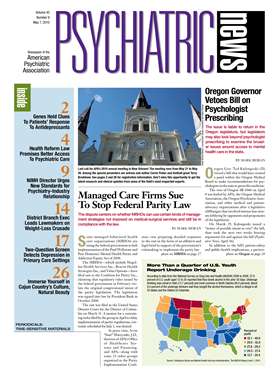Free resources have been made available to medical schools and residency programs by the National Institute on Drug Abuse (NIDA) to help faculty teach students and residents about substance abuse.
As a part of NIDA's efforts to broaden effective substance-related screening and treatment in primary care settings, several medical education curricula have been added to the agency's NIDAMed Web site at <
www.drugabuse.gov/coe/coe.htm>. The curricula can be incorporated together or selectively into medical-school syllabuses and residency training.
Eight medical schools have partnered with NIDA to create the educational materials, which include lectures, case studies, faculty workshops, and videos.
The curricula are part of NIDA's broader physician outreach initiative, Gaya Dowling, Ph.D., deputy chief of the Science Policy Branch in NIDA's Office of Science Policy and Communications, told Psychiatric News. The initiative involves creating and disseminating information about substance use disorders to a range of audiences, from physicians and medical students to patients, to improve communication on a subject that many find difficult to discuss.
Substance Use Affects Primary Care
Most of the curricula consist of case-based teaching materials to help medical students and residents understand how diagnosing and treating substance use disorders are an integral part of primary care, Dowling emphasized. “There are so many demands on primary care physicians,” she said, “it is difficult to spend time on substance use. Nevertheless, primary care physicians cannot afford to overlook the problem.”
“Over 20 million Americans are in need of substance abuse treatment,” Dowling pointed out. Long-term addictive behaviors such as smoking, excessive drinking, and illicit drug use can lead to symptoms and illnesses in the cardiovascular and other organ systems and affect overall health, she noted, but patients' access to treatment for substance abuse is seriously inadequate. Therefore, training medical students and early-career general practitioners is essential to begin to address this large gap between needs and available care.
“We had a lot of interest from [medical] schools on developing curricula about treating pain appropriately and adequately while managing patients at risk for abuse.... This is an issue that really resonates with the medical community,” said Dowling.
Practicing physicians who struggle to manage patients with substance use problems will also find the resource materials useful.
Stigma not only makes patients reluctant to admit to problems but also affects physicians' attitudes, said psychiatrist and educator Barbara Schindler, M.D., in an interview with Psychiatric News. “The attitude of hopelessness among physicians over substance use disorders impacts their willingness to treat substance use,” she said.
Even general psychiatrists often overlook signs of substance use disorders, she said, noting that in her clinical practice, female patients frequently present with dual diagnoses: a mood disorder or posttraumatic stress disorder with comorbid substance use problems, for example. “Physicians have to view patients as a whole and treat all symptoms,” she emphasized.
Schindler is the William Maul Measey Chair in Medical Education, vice dean of educational and academic affairs, and a professor of psychiatry at Drexel University College of Medicine. In the teaching module produced by Drexel, Schindler gives a demonstration of initial and follow-up visits with a typical patient played by an actor.
Curriculum Tackles Key Competencies
The topics in the curricula were selected by the participating medical schools, Dowling explained. Particularly relevant to issues common to general medicine, several curricula focus on prescription-drug misuse and treating chronic pain with opioids, which are growing concerns in the primary care setting, according to Dowling. In addition, Creighton University produced a curriculum on methamphetamine abuse, and the University of North Dakota created one on substance abuse among physicians.
Although most curricula are case-based written materials designed for faculty members, the curriculum created by Drexel University contains multimedia presentations, including video demonstrations of clinical assessments, and lectures. It also includes videos of five patients in recovery from alcohol or substance use disorders being interviewed about their experience with the disease, treatment, relapse, and recovery.
“To actually hear from real people with substance use disorders is very valuable for students and residents,” said Schindler. The images and words of people in recovery are important for dispelling the negative attitude that some students and physicians have toward these patients.
For this module, Drexel University staff made use of its distance-learning technologies. Drexel's medical school created a Web-based medical education tool known as
Doc.com, which can be accessed at <
webcampus.drexelmed.edu/doccom/user>, in collaboration with the American Academy on Communication in Healthcare.
Doc.com contains dozens of multimedia teaching modules and video-based clinical assessment tests. Students can log on and interact live with a standardized patient, played by an actor or faculty member, and then be evaluated by their professor.
Doc.com has close to 10,000 registered users from 20 medical schools around the world, Dennis Novack, M.D., a professor of medicine and associate dean of medical education at Drexel, told
Psychiatric News. Access to other modules on the Web site requires a subscription fee to offset some of the cost of maintaining and expanding the site, but the module on substance use, developed with support from NIDA, is free.
“It is the most comprehensive and compelling module to date,” said Novack. “We hope it has an impact in changing the behaviors, skills, and attitudes of physicians in treating these patients.”
NIDA provided approximately $60,000 to each participating school to fund curriculum development.
Drexel will begin to implement the teaching module on substance use screening and intervention in its medical school curriculum next year and examine its effectiveness on changing students' attitudes and competency in this area, said Schindler.
NIDA plans to continue its collaboration with the schools as well as the AMA to “market” these teaching curricula and develop additional content on treating addiction in general medicine, said Dowling. “We need to convey to [medical] schools the importance of the substance use issue and integrate it into the medical mindset.”


